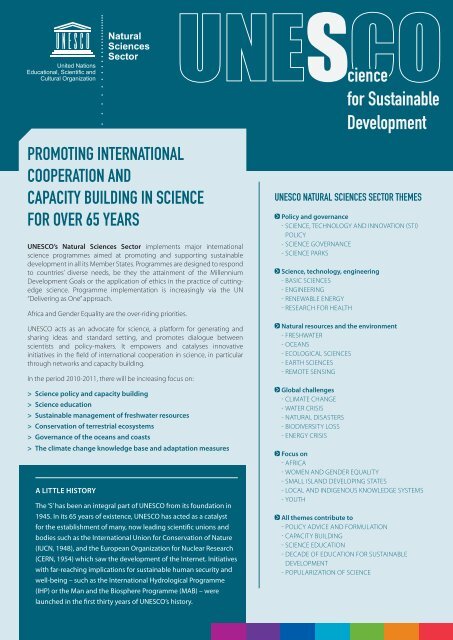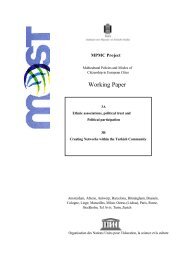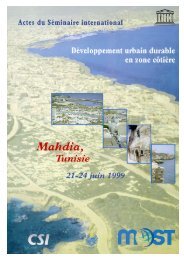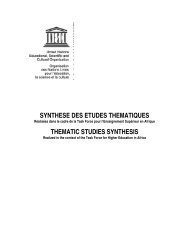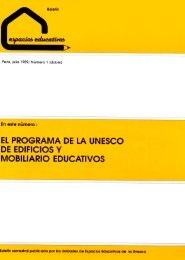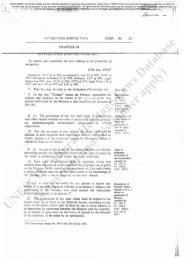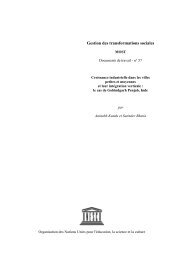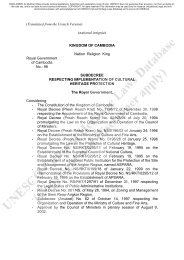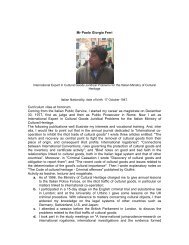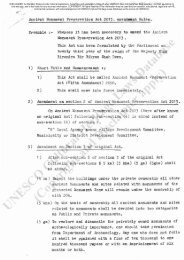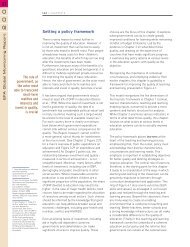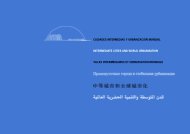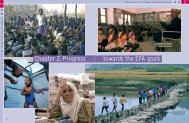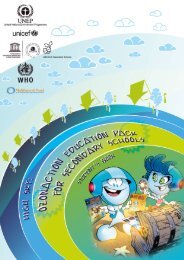Science for Sustainable Development - Unesco
Science for Sustainable Development - Unesco
Science for Sustainable Development - Unesco
Create successful ePaper yourself
Turn your PDF publications into a flip-book with our unique Google optimized e-Paper software.
United Nations<br />
Cultural Organization<br />
Natural<br />
<strong>Science</strong>s<br />
Sector<br />
cience<br />
<strong>for</strong> <strong>Sustainable</strong><br />
<strong>Development</strong><br />
Promoting international<br />
cooperation and<br />
capacity building in science<br />
<strong>for</strong> over 65 years<br />
UNESCO’s Natural <strong>Science</strong>s Sector implements major international<br />
science programmes aimed at promoting and supporting sustainable<br />
development in all its Member States. Programmes are designed to respond<br />
to countries’ diverse needs, be they the attainment of the Millennium<br />
<strong>Development</strong> Goals or the application of ethics in the practice of cuttingedge<br />
science. Programme implementation is increasingly via the UN<br />
“Delivering as One” approach.<br />
Africa and Gender Equality are the over-riding priorities.<br />
UNESCO acts as an advocate <strong>for</strong> science, a plat<strong>for</strong>m <strong>for</strong> generating and<br />
sharing ideas and standard setting, and promotes dialogue between<br />
scientists and policy-makers. It empowers and catalyses innovative<br />
initiatives in the field of international cooperation in science, in particular<br />
through networks and capacity building.<br />
In the period 2010-2011, there will be increasing focus on:<br />
> <strong>Science</strong> policy and capacity building<br />
> <strong>Science</strong> education<br />
> <strong>Sustainable</strong> management of freshwater resources<br />
> Conservation of terrestrial ecosystems<br />
> Governance of the oceans and coasts<br />
> The climate change knowledge base and adaptation measures<br />
A Little History<br />
The ‘S’ has been an integral part of UNESCO from its foundation in<br />
1945. In its 65 years of existence, UNESCO has acted as a catalyst<br />
<strong>for</strong> the establishment of many, now leading scientific unions and<br />
bodies such as the International Union <strong>for</strong> Conservation of Nature<br />
(IUCN, 1948), and the European Organization <strong>for</strong> Nuclear Research<br />
(CERN, 1954) which saw the development of the Internet. Initiatives<br />
with far-reaching implications <strong>for</strong> sustainable human security and<br />
well-being – such as the International Hydrological Programme<br />
(IHP) or the man and the biosphere programme (MAB) – were<br />
launched in the first thirty years of UNESCO’s history.<br />
-<br />
UNESCO Natural <strong>Science</strong>s Sector themes<br />
Policy and governance<br />
- <strong>Science</strong>, Technology and Innovation (STI)<br />
Policy<br />
- <strong>Science</strong> Governance<br />
- <strong>Science</strong> Parks<br />
<strong>Science</strong>, technology, engineering<br />
- Basic <strong>Science</strong>s<br />
- Engineering<br />
- Renewable Energy<br />
- Research <strong>for</strong> Health<br />
Natural resources and the environment<br />
- Freshwater<br />
- Oceans<br />
- Ecological <strong>Science</strong>s<br />
- Earth <strong>Science</strong>s<br />
- Remote Sensing<br />
Global challenges<br />
- Climate Change<br />
- Water Crisis<br />
- Natural Disasters<br />
- Biodiversity Loss<br />
- Energy Crisis<br />
Focus on<br />
- Africa<br />
- Women and Gender Equality<br />
- Small Island Developing States<br />
- Local and Indigenous Knowledge Systems<br />
- Youth<br />
All themes contribute to<br />
- Policy Advice and Formulation<br />
- Capacity Building<br />
- <strong>Science</strong> Education<br />
- Decade of Education <strong>for</strong> <strong>Sustainable</strong><br />
<strong>Development</strong><br />
- Popularization of <strong>Science</strong>
The Natural <strong>Science</strong>s Sector:<br />
structure, networks, communities<br />
3<br />
1<br />
2<br />
UNESCO'S REGIONAL SCIENCE OFFICES<br />
UNESCO'S CATEGORY 1 INSTITUTES<br />
The Natural <strong>Science</strong>s Sector, with a staff of around 200, is led by the<br />
Assistant Director-General <strong>for</strong> Natural <strong>Science</strong>s. Programmes and activities<br />
are implemented through UNESCO Headquarters and the UNESCO Field<br />
Office network. There are five regional UNESCO offices <strong>for</strong> science:<br />
Cairo (Arab States); Jakarta (Asia and the Pacific); Montevideo (Latin<br />
America and the Caribbean); Nairobi (Africa); and Venice (Europe<br />
and North America). Twenty-three of UNESCO’s 52 field offices have a<br />
Natural <strong>Science</strong>s Sector representative. UNESCO’s science programmes<br />
are implemented through its network of National Commissions and its<br />
multiple networks and partners both in the public and private sectors.<br />
Associated Institutes and Centres<br />
Category I Institutes are an integral part of UNESCO:<br />
1. The UNESCO-IHE Institute <strong>for</strong> Water Education, Delft, The<br />
Netherlands<br />
2. The Abdus Salam International Centre <strong>for</strong> Theoretical<br />
Physics (ICTP), Trieste, Italy<br />
3. The UNESCO Institute <strong>for</strong> Statistics (UIS), MONTREAL, CANADA<br />
Category II Centres under the auspices of UNESCO:<br />
A network of over 25 centres in the fields of water, renewable energy,<br />
science policy, mathematics, physics, biotechnology, the geosciences and<br />
remote sensing augment the Regular Programme by carrying out capacity<br />
building in their specific areas of competence.<br />
UNESCO Chairs in the Natural <strong>Science</strong>s<br />
Around 200 of the university Chairs in the UNESCO/UNITWIN Chairs<br />
Programme are in science – in the fields of basic and engineering sciences,<br />
ecological and earth sciences, science policy and sustainable development,<br />
water and ocean sciences.<br />
International <strong>Science</strong> Programmes<br />
- Intergovernmental Oceanographic<br />
Commission (IOC)<br />
- International Basic <strong>Science</strong>s Programme<br />
(IBSP)<br />
- International Hydrological Programme<br />
(IHP)<br />
- Man and the Biosphere Programme (MAB)<br />
- International Geosciences Programme (IGCP)<br />
UNESCO Intersectoral Plat<strong>for</strong>ms led by<br />
the Natural <strong>Science</strong>s Sector<br />
- UNESCO Action to Address Climate Change<br />
- <strong>Science</strong> Education<br />
- MauRitius Programme of Action <strong>for</strong> the<br />
<strong>Sustainable</strong> <strong>Development</strong> of Small Island<br />
Developing States<br />
For further in<strong>for</strong>mation:<br />
Executive Office<br />
Natural <strong>Science</strong>s Sector<br />
1, rue Miollis<br />
75732 Paris Cedex 15, France<br />
sc.communication@unesco.org<br />
www.unesco.org/science


